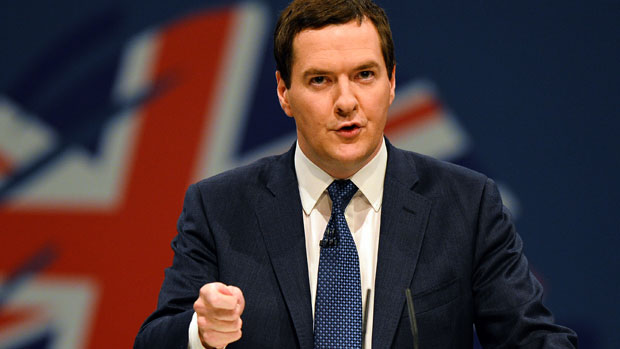Should George Osborne ease back on the pace of austerity?
Chancellor urged to slow down on spending cuts to protect the most vulnerable people in society

A free daily email with the biggest news stories of the day – and the best features from TheWeek.com
You are now subscribed
Your newsletter sign-up was successful
The Chancellor is coming under increasing pressure to slow the pace of government cuts – and from international economists as well as anti-poverty campaigners and local councils.
The Organisation for Economic Co-operation and Development, which backed George Osborne's austerity measures in the last parliament, is the latest group to warn of the effects of continued spending squeezes.
It highlighted the importance of reducing the effects of the cuts on the working poor and warned that the speed of the Chancellor's debt consolidation strategy risked putting the recovery in danger, the Financial Times reports.
The Week
Escape your echo chamber. Get the facts behind the news, plus analysis from multiple perspectives.

Sign up for The Week's Free Newsletters
From our morning news briefing to a weekly Good News Newsletter, get the best of The Week delivered directly to your inbox.
From our morning news briefing to a weekly Good News Newsletter, get the best of The Week delivered directly to your inbox.
Other influential bodies have already raised an eyebrow at the speed with which Osborne is introducing cuts. In response to the March budget, the independent Office for Budget Responsibility criticised the "rollercoaster" nature of planned spending cuts.
Labour is expected to urge the government to slow the pace of austerity today and embrace a more "moderate" plan for deficit reduction, claiming that Osborne's plan to eliminate all borrowing by 2017-18 was reminiscent of "neocon ideology".
Cuts to adult social care mean some of the most vulnerable people in society are being "placed in jeopardy", reports The Independent. As the social care budget is not ring-fenced, it has been cut by £4.6bn since 2010, a 31 per cent overall reduction. Health service bosses warn that social care cuts are adding to the pressure felt by the NHS.
Police forces have also been hit by budget cuts, with funding slashed by 18 per cent in real terms between 2010 and 2016, and "significant" further cuts expected, according to the National Audit Office.
A free daily email with the biggest news stories of the day – and the best features from TheWeek.com
The public spending watchdog says that the Home Office has little understanding of how much further it can cut funding in England and Wales without putting services at risk, the BBC reports.
Defending his debt consolidation strategy last month, Osborne told the Confederation of British Industry: "When it comes to saving money, we all know that the more you can do early, the smoother the ride."
But he may have other motives, the Guardian suggests. "Tory strategists are keen to push through painful cuts in the early years of the parliament to allow room for tax giveaways and more generous public sector pay settlements ahead of the 2020 election," says the newspaper.
-
 Political cartoons for February 16
Political cartoons for February 16Cartoons Monday’s political cartoons include President's Day, a valentine from the Epstein files, and more
-
 Regent Hong Kong: a tranquil haven with a prime waterfront spot
Regent Hong Kong: a tranquil haven with a prime waterfront spotThe Week Recommends The trendy hotel recently underwent an extensive two-year revamp
-
 The problem with diagnosing profound autism
The problem with diagnosing profound autismThe Explainer Experts are reconsidering the idea of autism as a spectrum, which could impact diagnoses and policy making for the condition
-
 How corrupt is the UK?
How corrupt is the UK?The Explainer Decline in standards ‘risks becoming a defining feature of our political culture’ as Britain falls to lowest ever score on global index
-
 The high street: Britain’s next political battleground?
The high street: Britain’s next political battleground?In the Spotlight Mass closure of shops and influx of organised crime are fuelling voter anger, and offer an opening for Reform UK
-
 Is a Reform-Tory pact becoming more likely?
Is a Reform-Tory pact becoming more likely?Today’s Big Question Nigel Farage’s party is ahead in the polls but still falls well short of a Commons majority, while Conservatives are still losing MPs to Reform
-
 Taking the low road: why the SNP is still standing strong
Taking the low road: why the SNP is still standing strongTalking Point Party is on track for a fifth consecutive victory in May’s Holyrood election, despite controversies and plummeting support
-
 What difference will the 'historic' UK-Germany treaty make?
What difference will the 'historic' UK-Germany treaty make?Today's Big Question Europe's two biggest economies sign first treaty since WWII, underscoring 'triangle alliance' with France amid growing Russian threat and US distance
-
 Is the G7 still relevant?
Is the G7 still relevant?Talking Point Donald Trump's early departure cast a shadow over this week's meeting of the world's major democracies
-
 Angela Rayner: Labour's next leader?
Angela Rayner: Labour's next leader?Today's Big Question A leaked memo has sparked speculation that the deputy PM is positioning herself as the left-of-centre alternative to Keir Starmer
-
 Is Starmer's plan to send migrants overseas Rwanda 2.0?
Is Starmer's plan to send migrants overseas Rwanda 2.0?Today's Big Question Failed asylum seekers could be removed to Balkan nations under new government plans